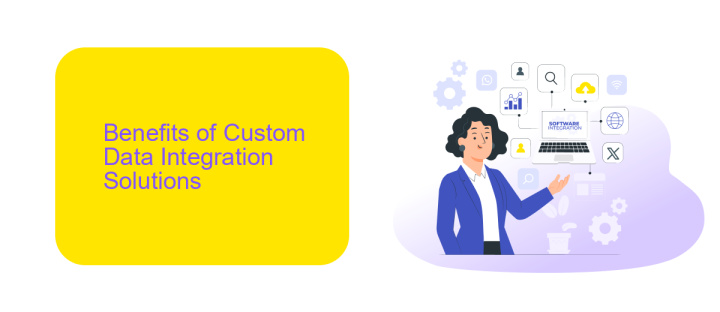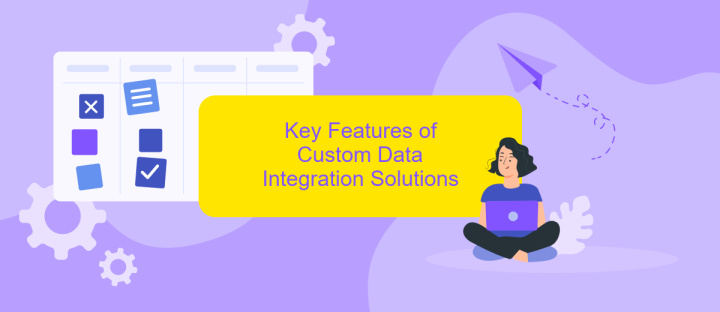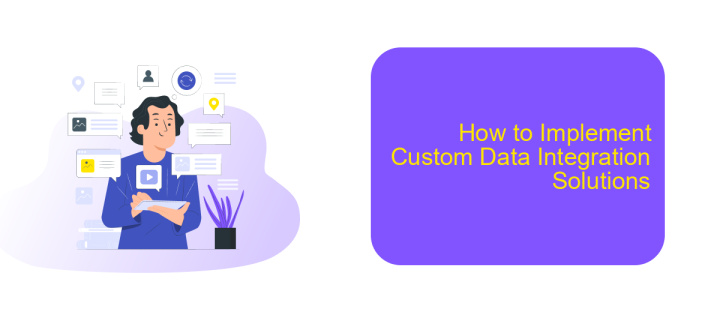Custom Data Integration Solutions
In today's fast-paced digital landscape, businesses require seamless integration of diverse data sources to stay competitive. Custom Data Integration Solutions offer tailored approaches to unify disparate data, ensuring efficient workflows and informed decision-making. By leveraging these bespoke solutions, organizations can optimize operations, enhance data accuracy, and drive innovation, ultimately achieving a cohesive and agile data ecosystem.
Introduction
In today's digital landscape, businesses are increasingly relying on custom data integration solutions to streamline their operations and enhance decision-making processes. These solutions enable seamless communication between disparate systems, ensuring that data flows smoothly across various platforms.
- Improved data accuracy and consistency
- Enhanced operational efficiency
- Scalability to accommodate growing data needs
- Real-time data access and analysis
One of the tools that can significantly simplify the process of setting up custom data integrations is ApiX-Drive. This service allows businesses to easily connect different applications and automate data transfers without the need for extensive coding. By leveraging such tools, organizations can focus more on their core activities and less on the technical challenges of data integration.
Benefits of Custom Data Integration Solutions

Custom data integration solutions provide businesses with the flexibility to tailor data flows according to their unique requirements. Unlike off-the-shelf solutions, custom integrations can be designed to handle specific data formats, sources, and destinations, ensuring seamless data exchange between disparate systems. This level of customization not only improves data accuracy but also enhances operational efficiency by automating data transfer processes that would otherwise require significant manual effort.
Moreover, custom data integration solutions can be scaled and modified as the business grows or its needs evolve. Services like ApiX-Drive, for instance, offer robust tools to set up and manage these integrations effortlessly. By leveraging such platforms, businesses can quickly adapt to new data sources or changes in existing ones without extensive re-engineering. This adaptability ensures that the data integration framework remains resilient and responsive to the dynamic business environment, ultimately driving better decision-making and competitive advantage.
Key Features of Custom Data Integration Solutions

Custom data integration solutions offer a tailored approach to combining data from disparate sources, ensuring seamless data flow and improved business efficiency. These solutions are designed to meet specific organizational needs, providing flexibility and scalability that standardized solutions often lack.
- Scalability: Custom solutions can grow with your business, accommodating increasing data volumes and new data sources.
- Flexibility: They can be adapted to integrate with various systems, including legacy applications and modern cloud services.
- Enhanced Security: Custom integrations can include advanced security measures tailored to your specific requirements.
- Real-time Data Processing: These solutions enable real-time data synchronization, ensuring up-to-date information across all systems.
- Comprehensive Support: Services like ApiX-Drive provide robust tools and support for setting up and maintaining custom integrations, reducing the technical burden on your team.
By leveraging custom data integration solutions, businesses can achieve a more cohesive data environment, driving better decision-making and operational efficiency. The ability to tailor these solutions to specific needs ensures that organizations can effectively manage and utilize their data assets.
How to Implement Custom Data Integration Solutions

Implementing custom data integration solutions involves several crucial steps to ensure seamless data flow between systems. First, identify the specific data sources and destinations that need to be integrated. This involves understanding the data formats, protocols, and volumes involved.
Next, design the integration architecture. This includes selecting appropriate tools and technologies that can handle the data transformation and transfer processes. Consider using services like ApiX-Drive, which simplifies the integration process by providing pre-built connectors and a user-friendly interface.
- Identify data sources and destinations
- Design integration architecture
- Choose the right tools and technologies
- Implement data transformation and transfer processes
- Test and validate the integration
Finally, thoroughly test the integration to ensure data accuracy and reliability. Validate that the data is correctly transformed and transferred between systems without any loss or corruption. Regular monitoring and maintenance are essential to address any issues and to adapt to changing data requirements.
- Automate the work of an online store or landing
- Empower through integration
- Don't spend money on programmers and integrators
- Save time by automating routine tasks
Case Studies of Successful Custom Data Integration Implementations
One notable example of a successful custom data integration implementation is a retail company that leveraged ApiX-Drive to streamline their sales and inventory data. By integrating their e-commerce platform with their inventory management system, they achieved real-time updates on stock levels, reducing the risk of overselling and improving customer satisfaction. The seamless data flow enabled the company to make more informed decisions, optimize stock levels, and ultimately increase their revenue.
Another case involves a healthcare provider that used ApiX-Drive to connect their patient management system with various third-party applications. This integration allowed them to automate the transfer of patient data, appointment schedules, and billing information, significantly reducing administrative workload and minimizing errors. The custom solution not only enhanced operational efficiency but also improved the overall patient experience by ensuring timely and accurate information exchange.
FAQ
What is custom data integration?
Why is custom data integration important for businesses?
How long does it typically take to implement a custom data integration solution?
What are some common challenges in custom data integration?
Can custom data integration solutions be automated?
Apix-Drive is a universal tool that will quickly streamline any workflow, freeing you from routine and possible financial losses. Try ApiX-Drive in action and see how useful it is for you personally. In the meantime, when you are setting up connections between systems, think about where you are investing your free time, because now you will have much more of it.


